1319
Multiverse
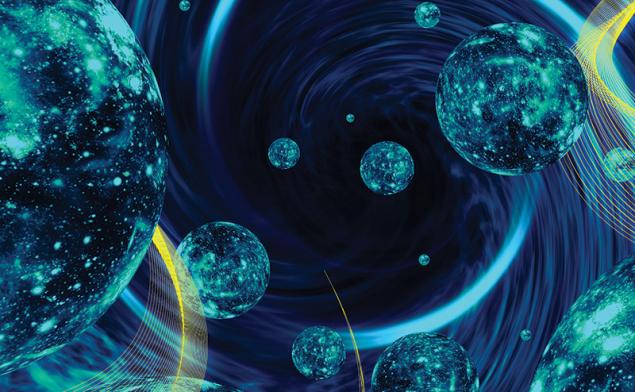
Multiverse - a hypothetical set of all possible real-life parallel universes (including the one in which we are). Of the structure of a multiverse, the nature of each universe, part of its structure, and the relationship between the universe depends on the selected hypothesis.
Various hypotheses about the existence of the multiverse expressed specialists cosmology and astronomy, physics, philosophy, science fiction.
The term "multiverse" was created in 1895, the philosopher and psychologist William James (William James) and popularized by science fiction writer Michael Moorcock. Often also used terms such as "alternate universes", "alternate realities", "parallel universes" or "parallel worlds».
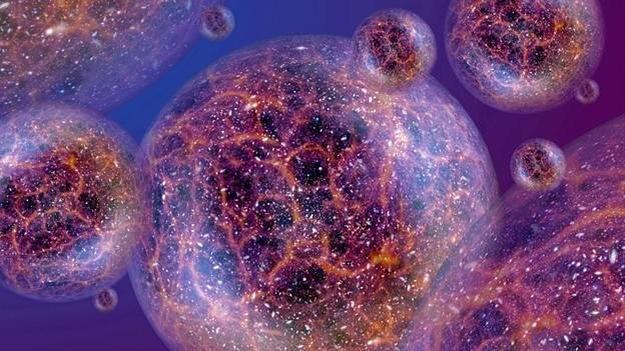
The possibility of the existence of the multiverse gives rise to various scientific, philosophical and theological questions. This idea is widely used, for example, a string theory. The assumption of the existence of the multiverse is also used in many-worlds interpretation of quantum mechanics.
Max Tegmark suggested that any mathematically consistent set of physical laws relevant independent, but the real universe. This assumption, though not amenable to experimental verification, appealing that removes the question of why the observed physical laws and the values of the fundamental physical constants is such.
Tegmark proposed the following classification of the worlds beyond our:
Level 1: the worlds beyond our cosmological horizon
Level 2: worlds with different physical laws
Level 3: the many-worlds interpretation of quantum mechanics
It includes universes arising in the framework of the many-worlds interpretation of quantum mechanics.
Level 4: the final ensemble
Possible worlds - one of the means of interpretation of probability, hypothetical reasoning, and so on. N. In this regard, a number of philosophers, such as David Lewis, states that any possible world is realized, since the possibility and reality - are two additional features of the same world . Accordingly, it is an opportunity, and that really depends on the world in which the observer (this concept is called "modal realism»).
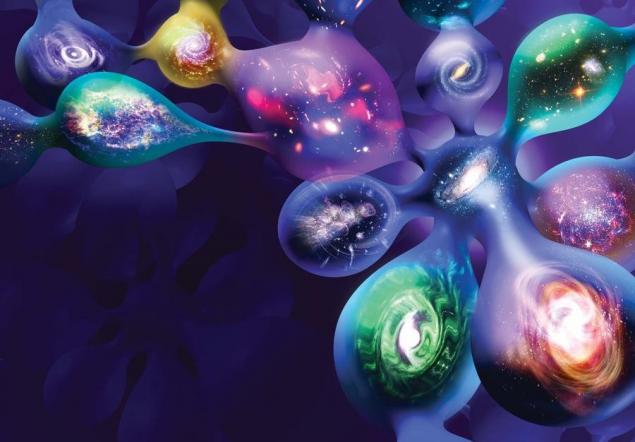
The concept of multiple worlds repeatedly mentioned in the Hindu Puranas, particularly in the Bhagavad Purana:
You exist in the beginning, middle and end of everything, from the smallest particles of cosmic manifestation - the atom - to the gigantic universes and all of the material energy. However, you forever without beginning, end or middle. You are perceived to exist in these three phases, and thus You are the same. When this cosmic manifestation does not exist, you exist as the original potency ... There are innumerable universes beyond this, and despite the fact that they are infinitely large, they move in you, like atoms.
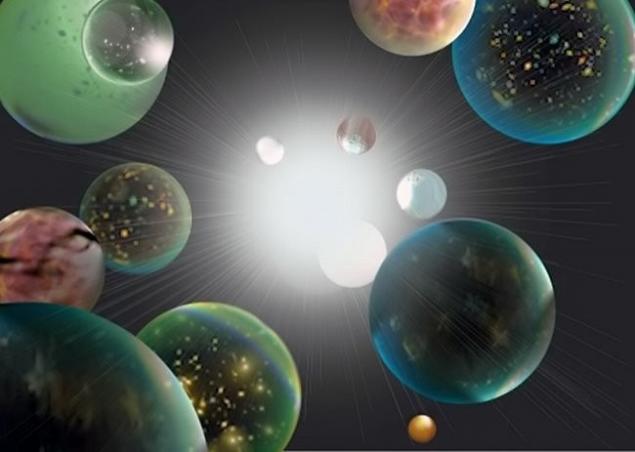
WE LIVE in the multiverse?
The recent sensational discovery of traces of gravitational waves in the microwave cosmic radiation confirms that our world - just one of countless universes. Moreover, it is one of the few worlds where life may occur.
Those who are bored with the usual three or four measurements (left to right, back and forth, up and down, and only forward - into the future), cosmologists, who study the origin of our universe, offer attractive alternatives.
Recently discovered traces of gravitational waves in the cosmic microwave background on the assumptions physicists suggest that we live in a multiverse - space, consisting of many universes.
The inflationary model of the universe
The results showed that the inflation of space-time, t. E. The exponential expansion of all its dimensions, there was so intense that formed as a result of the structure had to be many times greater than the scale of our universe.
In most scenarios, the inflationary model provides the appearance of the Multiverse.
- Professor Andrei Linde, a Soviet-American physicist, Stanford University
Soviet physicist Andrei Linde first described the chaotic inflation scenario in 1983, having developed the original theory of the Universe, Alan Guth inflation.
Both the master of theoretical physics were present at a press conference at the Harvard-Smithsonian Center for Astrophysics, during which it was announced the sensational discovery of traces of gravitational waves in the CMB.
The results confirm the group BICEP2 models in which the inflation process of space-time came with an intensity that suggests the birth of many universes. This means that immediately after the Big Bang, new worlds are born again and again.
The existence of the multiverse perfectly explains many phenomena occurring in our world. For example, the emergence of life on Earth.
- Alan Guth at MIT
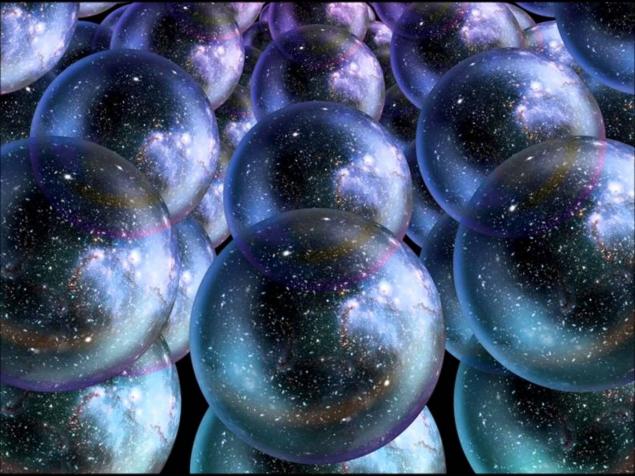
Free lunch
Alan Guth compares multiverse with free lunch. Andrei Linde adds: it is also a buffet where you can choose from countless dishes.
Both physicists believe that the worlds, formed after the Big Bang may be completely different, different from each other. Our universe is filled with stars, planets, gas nebulae and galaxies - just one of many variations of innumerable worlds.
It is possible that other universes are deprived of such concepts as familiar space-time, gravity, photons, atoms and other building blocks of our universe. These worlds can be unlike anything on the fact that we are generally able to imagine.
Multiverse, chaotic inflation generated from the starting point of the Big Bang, is composed of many universes (including our own), which are separated from each other unimaginable spaces.
This means that the estimated size of our universe - about 92 billion light-years - a point among a myriad of other worlds, with different dimensions and physical properties of trajectories.
Solution mysteries of astrophysics
Although Alan Guth, and is a staunch supporter of the Multiverse, even he admits that it is a question only of a convenient theoretical model, which explains the variety of phenomena embarrassing generations of cosmologists.
For example, in 1998, astrophysicists have discovered that galaxies of our universe fly with great acceleration, whereas the gravitational attraction were to slow their movement.
This finding, the authors of which in 2011, deservedly won the Nobel Prize in physics, many scientists believe, presupposes the existence of so-called "dark energy", which on a cosmic scale confronts the forces of gravitational attraction.
But what the "dark energy"? In the words of Michael Turner of the University of Chicago, the only thing we know about her is her name.
According to quantum theory, the vacuum should always appear, and then disappear subatomic particles, which are provided with a space "dark energy." However, in order to explain the observed phenomena, the vacuum energy should be on the order of 120 (10 in the 120-degree) exceed the results of theoretical calculations. Such a monstrous mismatch theory and practice puts physicists in a deadlock.
Multiverse elegantly solves this problem. Inflationary expansion of space in a myriad of different worlds could lead to the fact that in one of them - in our universe - the role of "dark energy" was insignificant. In other universes, it takes the form of monstrous anti-gravity forces rapidly raznosyaschih matter in all directions.
11 dimensions of string theory
Another difficult question that can be answered the concept of the Multiverse - the number of measurements, predicted the famous theory of superstrings. Subatomic particles, according to string theory, are composed of tiny strings of energy in the space of 11 dimensions.
But how to reconcile string theory known to us from the four-dimensional space-time? Perhaps she describes not only our universe, but also all sorts of planes of the Multiverse? According to string theory, the number of universes to be in the region of 10 to 500-degree (ie. E. 1 with 500 zeros).
In short, "welcome to the club of the Multiverse!", As Andrei Linde in its recent review of inflationary cosmology. The concept of the Multiverse easily and elegantly solves many problems over which fought a decade leading minds in astrophysics.
All that is necessary for life
But that's not all. Multiverse can even explain the problem, not directly related to physics. Among them are the so-called "anthropic principle": We see a universe, because only in such a universe could be an observer, a man.
From the point of view of cosmology, our Universe literally created for it appeared life. All kinds of physical constants, the relative weakness of the gravitational force compared to the electromagnetic and strong interactions - all perfectly matched to each other so that as a result there were the stars, planets, water, carbon compounds, and life itself.
If our universe is only generated by the Big Bang, so good luck to the origin of life was simply impossible.
But if as a result of chaotic inflation were spawned countless myriads of worlds, several universes like ours, receive, from the point of view of physics, a real chance to exist.
The chance that we have used and continue to use it.
We are manifestations of the universe ....
That everything in the universe - not one infinite space and infinite























